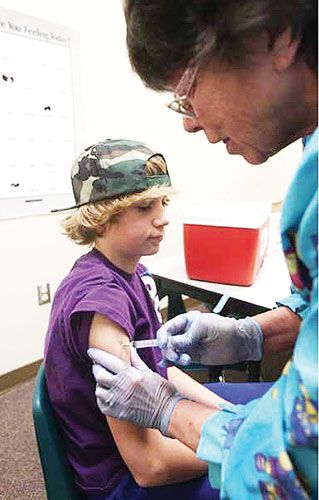New vaccination law designed to educate parents
Published 8:45 am Friday, March 7, 2014

- Some parents are concerned that multiple vaccines in one injection like measles-mumps-rubella may be too taxing on their young childs immune system if administered all at one time.
To vaccinate or not is a personal choice, and those rights remain intact under the new Oregon law on vaccines that took effect March 1.
But for parents of kindergarten age children, this law changes the status quo in two major ways.
First, the law expands the number of allowable reasons parents can choose not to have their children vaccinated from two to four, which allows parents to better describe their reason for not vaccinating.
Second, the law requires that parents take a lesson in vaccine science presented by the Oregon Public Health Division before they make a final decision on whether to vaccinate.
With the new law, possiblevaccine exemptions include medical, religious, philosophical and personal reasons, more in sync with other states’ laws. The non-medical exemptions – or NMEs – are the focal point of this new law.
In past years, parents who had a personal or philosophical reason for refusing vaccines for their children often selected “religious exemption” on the state’s immunization status form because there was no personal or philosophical choice available to select.
Though “religious exemption” in those cases did not correctly describe their reasons, it nonetheless achieved the desired end result, and it was an easy process to complete. The new law will now differentiate parents with religious exemptions from those with personal or philosophical grounds for not vaccinating.
Parents who have previously filed for a religious exemption will be grandfathered in under the new law. Parents of unvaccinated or partially vaccinated kindergarten students and homeschooled students transferring to a public school will have to meet the education requirement of the new law before they can claim an NME.
To fulfill the educational requirement of this new law, parents must either make an appointment for a consultation with their child’s physician or take the interactive module online and answer the verification and comprehension questions at the end of the module.
In either case, there will be a way to verify if a parent has fulfilled the education requirement of the new law.
Connie Carter, R.N. Immunization Coordinator with Union County’s Center for Human Development, said, “The state is not trying to take anyone’s rights away. The whole purpose of the new law is to provide parents with scientifically-based information that supports why vaccines are safe and why they are needed. Once that’s done, they can sign off and can decide what they want to do.”
Alicia Hills, nursing supervisor at the Baker County Health Department, said she believes the lesson required by the new law should help alleviate parents’ fears about immunizations.
“We’ll be working with the school districts and medical providers to help them understand the new guidelines,” Hills said.”I think this will help people understand the benefits and risks,” she said.
Hills said the health department will have a lot of information available at school registration in August.
In practical terms, the new law won’t have an impact on the children until the county nurses do their annual immunization status review at each school on Feb. 19, 2015, said Carter.
Children who are not up to date with their vaccinations at that time will be excluded from school unless they have a NME on file at school. Even with an NME, a child may be sent home if a disease outbreak occurs at school. That means parents will have to homeschool their child or get their homework from school until the outbreak is over, Carter said.
The concern of the Oregon Public Health Division and the basis for this new law seems to stem from a steadily growing number of non-medical exemptions (NMEs) on file at Head Start, preschools and in kindergarten classes in public school districts. As this number grows, herd immunity weakens.
According to the Oregon Public Health Division, the number of NMEs has steadily risen from 2.4 percent in 2001-02 to 6.4 percent in 2012-13, whereas nationwide, the Center for Disease Control records NMEs at 1.8 percent.
In Northeastern Oregon in 2012-13, Wallowa County had the highest rate of exemptions among the state’s 36 counties, at 15.2 percent. Baker County had the fifth-highest exemption rate at 8.9 percent.
Union County, by contrast, had a rate of 4 percent, lower than all but seven counties.
Wallowa County’s exemption rate is lower so far in 2014, at 6 percent. That figure includes reviews of students in Head Start, one preschool, and the Seventh Day Adventist School in Enterprise.
Drafters of the new Oregon law believe the steady rise in NME’s is attributed to a lack of science-based information to parents.
“That is what the state is thinking, yes,” said Jodi Beck, administrative assistant at the Wallowa Health Department. “The state wants people to be aware of the risks, and what can happen if you choose not to vaccinate. That’s what they are thinking – that it is a lack of education.”
The reasons given to Beck for refusing vaccines doesn’t indicate a lack of research, however.
“Our experience in Wallowa County has been that it’s not that these people aren’t educated. They have done a lot of research,” she said. “They are not opposed to all vaccines, but they are just opposed to some of them. They don’t like the way they are processed, chicken pox in particular. They don’t think that one is necessary. Everybody thinks they had chicken pox when they are kids so it’s no big deal.”
Some parents are concerned that multiple vaccines in one injection like measles-mumps-rubella may be too taxing on their young child’s immune system if administered all at one time.
“MMR is a particular one they don’t like,” said Beck “because of how that one is processed. Some people do not want to get all those vaccines at once. DTaP is three vaccines in one. They don’t like that. They don’t want any preservatives, which most vaccines are made without preservatives. There are still some that do have some (preservatives). It doesn’t seem to be an education thing. It’s just a personal reason. Everybody has a different reason.”
Parents objecting to vaccines get their research information from books, talking to medical professionals and from the Internet. But Stacy de Assis Matthews, school law coordinator for the Oregon Public Health Division, said there is a lot of misinformation online.
Consequently, the state wants parents of kindergarten children to hear the science-based facts as presented by the state before they decide in favor of an exemption. Oregon is hopeful because this approach worked well for Washington after that state passed its vaccine law in 2011. Between 2009 and 2013, the number of Washington parents claiming NMEs dropped from 7.6 to 4.6 percent.
Dissenting parents argue that vaccinations do not always translate to immunity.
“The vaccines don’t protect 100 percent so there are some occasions where the person will still get the disease they have been vaccinated for,” said Fisher. “Every vaccine is different (in its efficacy), but on average, they are about 80 percent. Some are lower and some are higher.”
Still, Carter warned it’s the best defense we have for these diseases.
“We have had positive cases of whooping cough (pertussis) in Union County and measles in Oregon. Whooping cough can be so severe and coughing is so hard that it’s almost impossible to catch your breath. It’s very serious.”
Fisher said parents who are concerned about what’s in a vaccine are welcome to read the information that comes with the vaccines in their inventory.
“We definitely encourage any parents who have questions or want information to ask us,” said Fisher. “The more informed they are the better job they are doing as a parent. We can copy the package insert or give them materials or let them read, or ask questions or come at a later date for their vaccines after they have thought about it. Whatever they want to do to learn more about it.”
For more information from the county on vaccines, visit http://www.historyofvaccines.org/content/articles/human-cell-strains-vaccine-development
http://www.chop.edu/service/vaccine-education-center/vaccine-safety/vaccine-ingredients/fetal-tissues.html
Read the law at:
https://public.health.oregon.gov/PreventionWellness/VaccinesImmunization/RulesLaws/Documents/Law333-050sb0132.pdf
Lisa Britton, a correspondent for the Baker City Herald, contributed to this story. exemptions or NME’s are the focal point of this new law.









